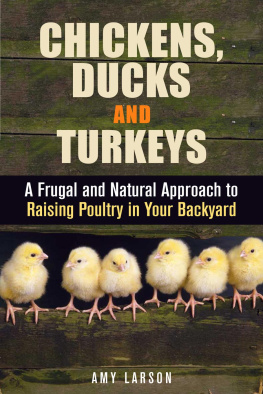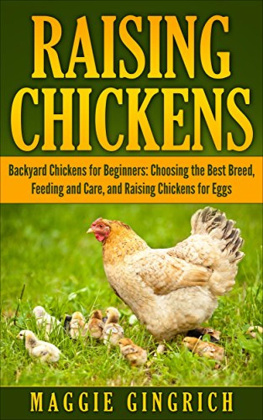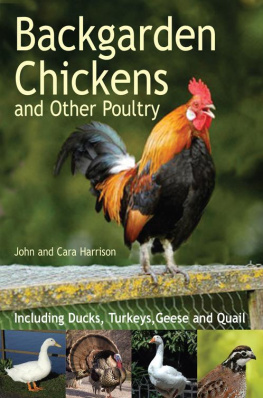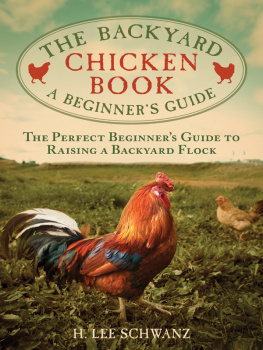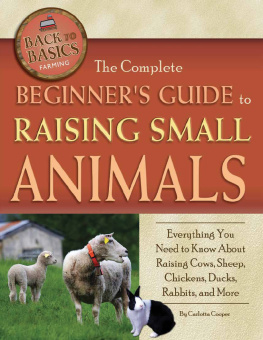STOREYS GUIDE TO RAISING POULTRY
FOURTH EDITION
Storeys Guide to
RAISING POULTRY
Chickens Turkeys Ducks Geese Guineas Game Birds

Glenn Drowns

The mission of Storey Publishing is to serve our customers by
publishing practical information that encourages
personal independence in harmony with the environment.
Edited by Deborah Burns and Rebekah Boyd-Owens
Art direction and book design by Cynthia N. McFarland
Cover design by Kent Lew
Text production by Theresa Wiscovitch
Front cover photograph by David Chapman/Alamy
Illustrations by Elayne Sears
Indexed by Samantha Miller
Special thanks to Ed Hart for reviewing the text
2012 by Glenn Drowns
All rights reserved. No part of this book may be reproduced without written permission from the publisher, except by a reviewer who may quote brief passages or reproduce illustrations in a review with appropriate credits; nor may any part of this book be reproduced, stored in a retrieval system, or transmitted in any form or by any means electronic, mechanical, photocopying, recording, or other without written permission from the publisher.
The information in this book is true and complete to the best of our knowledge. All recommendations are made without guarantee on the part of the author or Storey Publishing. The author and publisher disclaim any liability in connection with the use of this information.
Storey books are available for special premium and promotional uses and for customized editions. For further information, please call 1-800-793-9396.
Storey Publishing
210 MASS MoCA Way
North Adams, MA 01247
www.storey.com
Printed in the United States by Versa Press
10 9 8 7 6 5 4 3 2 1
LIBRARY OF CONGRESS CATALOGING-IN-PUBLICATION DATA
Drowns, Glenn.
Storeys guide to raising poultry / by Glenn Drowns. 4th ed.
p. cm.
Guide to raising poultry
Raising poultry
Previous editions entered under: Mercia, Leonard S.
Includes index.
ISBN 978-1-61212-000-3 (pbk. : alk. paper)
ISBN 978-1-61212-001-0 (hardcover : alk. paper)
1. Poultry. I. Title. II. Title: Guide to raising poultry. III. Title: Raising poultry.
SF487.D76 2012
636.5dc23
2012004611
To my wife, Linda Drowns,
for all of her support in my many endeavors,
and my parents, Willard and Doris Drowns,
for allowing me to get those first four ducklings
that started it all.
ACKNOWLEDGMENTS
THERE ARE MANY who deserve recognition, and I wish to thank all who contributed ideas and suggestions for this book. Your ideas and thoughts helped to create it all.
Special thanks to Melanie Slattery for doing some of the typing; to Annalisa Reganfuss for reading the first draft and providing me with ideas for topics to address; and to Ed Hart for reading the final draft.

Contents
PART 1
Getting Started


1
Should I Raise Poultry?
THERE ARE MANY POSSIBLE ANSWERS to the question, Should I raise poultry? For some, the thrill of exhibition and the thought of winning first place in a poultry show are enough to convince them to begin raising. For others, its the excitement of seeing a little bit of nature in their backyard. For still others, the pleasure or necessity of producing their own eggs and meat will start them down the poultry road. The artistic are drawn to the beauty and diversity of the birds. Hardcore gardeners are intrigued by the possibilities of using poultry for insect control and manure as fertilizer in their backyard gardens. A few individuals will even find poultry to be the perfect pets. Nearly everyone can identify with some facet of the poultry world and find valid reasons to raise these wonderful creatures.

A diverse flock of poultry can provide beauty, eggs, meat, and unparalleled entertainment.
URBAN RAISING ON THE RISE,
BUT CHECK WITH OFFICIALS
A growing number of cities and heavily populated towns allow residents to keep a few young chickens; that is, at least until three to four months when a rooster begins to crow. Its always a good idea to check on city and county ordinances in your area before you purchase poultry. In some cases, even in rural areas, you may not be allowed to have poultry or there may be a limit to the number of birds you may have.
Dont be surprised if you are not allowed to keep roosters. Their noisiness is considered an annoyance by some; it is their crowing that turns many neighborhood associations, small cities, and towns against their citizens raising poultry at all.
Many folks who decide to raise poultry want good food and something attractive. If thats your desire, you can have it. Entire breeds and many varieties of poultry are raised primarily for ornamental purposes. Keep in mind, however, that while they are considered ornamental, many of these breeds also produce a reasonable number of eggs and an acceptable meat product. With poultry, you can have the best of all worlds: eggs, meat, and aesthetically pleasing birds.
Raising Your Own Food
Perhaps the desire to know all the raising and feeding practices involved in the production of ones food is a leading reason many people in the twenty-first century choose to raise poultry. Backyard raisers may have decided to establish their own flock because they want to avoid genetically modified organism (GMO) crops used to feed commercial animals, or they are concerned over the use of preservatives and hormones. They may be trying to avoid trans fats or they may find the agribusiness approach to raising poultry inhumane and feel that supporting that kind of raising is bad for the environment.
Needless to say, one of the principal reasons for raising your own poultry is to have a good supply of fresh, delicious eggs. Nothing compares with eating an egg from your own flock that has a nice, deep, rich, dark orange yolk when cooked. Its a far cry from the pale, sickly, yellow, flattened yolk of an egg purchased at a supermarket.
You might also choose to butcher extra birds and supply your family with fresh, nutritious home-raised meat. Knowing exactly what your animal was fed and how it was cared for can make you feel at ease about the long-lasting health and environmental consequences of what youre putting into your mouth.

Poultry can be an ideal 4-H project.
For all the reasons one chooses to become a backyard raiser, one principle holds true. Anyone producer or consumer who knows the origin of his or her food cant help feeling confident and relaxed about this choice.
Next page

